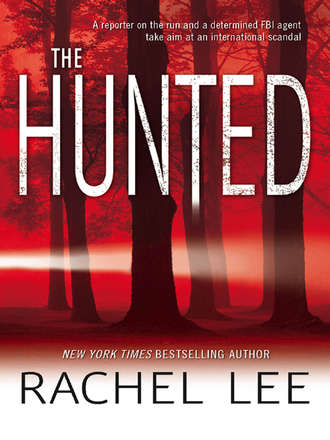
Полная версия
The Hunted
“Sounds…cold,” Erin said.
“It was.” He chewed his lip for a moment. “It was like a big play. GloboCorp wants to build a pipeline in some dust- or mud-covered corner of the world. The locals have two legal choices—go to work for GloboCorp and help tear up their ancestral homeland or be out of work. So they pick door number three. They get together and give themselves some fancy name…the People’s Liberation Army of Revolution or some such. They write a big manifesto against GloboCorp. GloboCorp buys K-R-and-R insurance and sends in a supply of easy-to-abduct workers, guys who want the hazard pay or whatever.
“The People’s Liberation Army abducts a few of them a month, not enough to really upset GloboCorp’s pipeline project, because then the gringos would come down in force and stomp the ‘movement’ into so much jungle jelly. So long as the kidnappers don’t get too greedy, the insurance geeks dutifully pay up. GloboCorp builds its pipeline. The locals make some money in the process, plus they feel as if they stood up to big, bad GloboCorp, fought the good fight, even if they lost.”
He shook his head. “Truth is, they were all just going through the motions. The K-R-and-R insurance and our fees and the rest of it was budgeted from the start, assessed within two or three percent by some math whiz wearing Coke-bottle glasses sitting in a Manhattan office and crunching numbers. It was all just the cost of doing business.”
“Pretty pragmatic,” Erin said.
“Hell, yes,” Jerrod agreed. “A few years later, the locals find a way to live with the pipeline and the guys who were running around the jungle kidnapping people are running for office, talking about how they fought for the people, and how they’re going to reform the government and end corruption. But by then, they’ve made so much money from the Globo-Corps of the world that they’re as corrupt as the rest.”
He paused. “And if they weren’t, if they were really serious about protecting their native land and culture…well, then they’ve gotta go. We send in one of my former colleagues to plant a car bomb or, even better, to set it up so the local cops or army can do it. Some lieutenant in the godforsaken army gets a medal, and good ol’GloboCorp keeps racking up the profits. The Dow Jones Index goes up, and all is right with the world.”
In the silence that followed, Jerrod realized he’d said way too much. He tried not to let himself think about those days. And this was why.
“And I thought I was a cynic,” Erin said. Her eyes were neither approving nor judgmental. There was something else there, something he couldn’t quite read. “So what really happened, Special Agent Westlake?”
He shook his head. “Another time. Or…not.”
He expected her to fire back another question. But this time she did seem to take “No” for an answer. He turned on the TV to a low volume, some program about global warming. He stared at the scenes of disappearing glaciers, while Erin dozed off. Meltwater running down through moulins, cutting loose the Ross Ice Shelf. The world coming apart.
But the scenes of dying glaciers merely provided a backdrop to his thoughts. White slavery. It existed. Law enforcement knew that without a doubt. But it was rare to find anyone involved who wasn’t beyond reach. Or to be able to prove the case once they were caught. The Dutch, a few years ago, had managed to crush some powerful white slavers who were bringing women out of Russia, promising them good jobs and then throwing them into brothels, where threats of violence against their families held them silent.
But there was another, even dirtier, side to that kind of operation. A much more clandestine one. The kind where individual children were snatched off the streets, young girls and boys, and sold to the twisted wealthy and powerful in other countries.
Those were the ones almost impossible to trace. The scumbags law enforcement found too slippery to grab. Somehow when Erin said that Mercator, a huge defense contractor, was involved in white slavery, he didn’t think she meant the kind of rings the Dutch had broken. There would be no advantage to Mercator in such a thing.
He closed his eyes against the doom portended by rapidly calving and melting glaciers, and turned inward to dark places he had to visit too often in his job. Places where innocent children were nothing but things to be used by someone with sick desires. Places where Elena lurked even yet.
If those were the kinds of things Erin was uncovering, then he wasn’t going to tell another soul. Not if Mercator was involved. That company had too much power and too much influence, and all too often he had seen where that could lead. They might take a hit on a penny-ante corruption case, but on something like this, they would be covered nine ways to Sunday.
The Mercators of the world didn’t get caught for things like white slavery.
Emotions he didn’t allow himself to have any longer tried to wedge their way up to his heart and mind like those moulins melting their way through the glaciers. They would have their day, but their day would be destructive. He forced them down again, and instead focused on the cool anger and determination that had proved his best friends for many years.
No heat. No passion to interfere with reason. He might be propelled by passion, but he steered by cold reason. Passion must be kept in the background, simmering and providing energy, but never dined on. Never indulged.
He opened his eyes again to discover that the very place he was sitting would probably be underwater in a hundred years. He supposed the global scale of the impending climate crisis might cast his obsession with the missing into obscurity, at least to some, but he felt differently.
That was why he climbed out of bed every morning.
Erin stirred, murmuring something in her sleep, and he took that as a good sign. She hadn’t sunk into a sleep so deep it meant the concussion was creating a problem.
He needed more information from her. Much more. Then he could decide a course of action. Although if she was right about what she claimed, then only one course lay ahead of him.
On the television, the narrator’s focus had shifted from glacial flooding to mega hurricanes. Erin spoke without opening her eyes. “Rita was a rush.”
“What?”
“Hurricane Rita. I covered it. Can’t say it was a happy rush.” Her eyes opened, as blue as gas flames.
“It hit us hard. It kind of got lost in the wake of Katrina. It wasn’t as bad because there were no levees left to break.” She stretched and yawned, then winced a little. “My neck is getting stiff.”
“Not surprising. You took a pretty hard blow.”
She stretched again, more cautiously, and curled up in the other direction. The TV commentator was now talking about desertification. Erin indicated the TV with a slight wave of her hand. “You listen to too much of that, you might get depressed.”
“It’s background noise. I already know about it.”
“Yeah? Do you do anything about it?”
He tilted his head a little to one side. “Do you?”
“Parry,” she said, with a smile that barely creased the corners of her eyes. “You’re as good as I am at dodging questions. Ever consider becoming a politician?”
“I’d have to sell my soul. And you didn’t answer my question.”
“That’s a two-way street. But yes, I try to do my part. I walk or take public transportation. I’ve replaced all my incandescent bulbs with those compact fluorescent ones. I don’t turn on my heat unless my fingers turn blue, and I do without air-conditioning unless it’s night and I can’t sleep. I also try not to buy anything that had to come from far away. You can’t always tell, but ‘grown in Chile’ or ‘made in China’ are good indicators.”
“You’re doing better than I am, then.”
“Aha.”
But the reaction lacked spirit. They were walking around the edges of a peril that could destroy them both, trying to reach for some level of normalcy and banter.
He knew all about that, and he suspected she did, too, from the way she was behaving. Sometimes you just had to ignore the elephant in the room, especially when you couldn’t deal with it right that instant. The other elephant, the one unfolding before them on TV, seemed more like a parable than a science program.
Finally Erin spoke. “I guess I’m going to have to trust you.”
He looked at her. “That’s another two-way street.”
“Is it?” She appeared dubious.
“Yes. I could get fired, too. I could get killed, too.”
“Then why?”
He returned his gaze to the TV, knowing he had to offer an answer, but unwilling to get too personal.
Finally he found a way. “I’ve spent my entire career in the Bureau trying to nail white slavers. I spend my personal time on it. It’s an obsession.”
She fell silent in thought. “But you do other stuff?”
“Of course. It’s part of my job. But finding the missing is my specialty. It’s what I do best. And my life doesn’t matter a hill of beans if I can put one white slaver into prison or save the life of one kid.”
He turned to her again and found her eyes had darkened, as if someone had turned down the gas flame and replaced it with blue ink.
“I believe you,” she said. “It’s like that for me, too. I don’t have a personal score to settle or anything, but the idea of those little kids…” She trailed off, frowning. “I make my living with words, but I deal in facts, so it’s hard for me to explain what I’m feeling. I just knew, when my source tipped me off to this, that it wasn’t a story I was going to let go.”
“Then we’re on the same page.”
“Maybe.” She stared at him hard, as if trying to see into him. He stared right back. He wasn’t one to blink.
“Okay,” she said finally. “Where do I start?”
“How about telling me just how much about this you shared with your editors? Then I’ll have some idea what the bad guys know.”
“I didn’t tell them much.”
“Apparently it was enough.”
She sighed and touched the side of her head.
“Where are those pain pills?”
“In your upper left vest pocket.” He went to the kitchenette to retrieve a club soda out of the fridge and then poured it into a glass for her. Then he returned to the couch, crossed his legs loosely and waited while she swallowed the medicine.
“You don’t trust easily, do you?” he asked.
“Apparently this time I trusted too much.”
One corner of his mouth lifted. “That’s how we learn, Erin.”
“Yeah, right. By being whacked on the head.” But he saw her gaze drift to the badge clipped to his belt. “I usually have an adversarial relationship with cops.”
“What do you mean?”
“Oh, I jolly around with them and build relationships, but I’m always trying to learn things they don’t want me to know. Things they’ve done wrong. Things they haven’t done that they should have. They see my role as being their mouthpiece. I see my role as being the public’s eyes and ears. The two are not the same.”
“Of course not.”
She raised her gaze to meet his. “It’s going to be weird being on the same team.”
He uncrossed his legs and leaned forward, resting his elbows on his knees and clasping his hands. “Here’s how I see it. You’re not going to walk away from this story, no matter what they’ve done. Firing you. Taking your work. Breaking into your place. Putting you in the hospital. You’re not giving up, right?”
“No way!”
“If I can see that, having known you only a few hours, then they know it, too. So now you’re the best source I have on an international crime ring, and the bad guys know you’re not quitting. I wouldn’t walk away from the crime regardless. I’m also not walking away and leaving you in their crosshairs. Since we’re stuck with each other, we may as well work together.”
She seemed to consider it for a moment before replying. “You have access to resources that I can’t get to on my own. So sure, we can work together. Just don’t try to shut down my story once this is over. You can put these people in jail, but I can put them on the nightly news. Which do you think will cost them more?”
He nodded. “You can write it once we’ve got the case. I won’t gag you. But look at it this way, Erin. Right now, right this very instant, while you’re hesitating about what to share, they’re still trying to find you. Because you can lead them to their leak. Quit wasting time. They sure as hell aren’t.”
She lowered her head briefly. “It’s easier to walk into a forest fire,” she said quietly. “At least you can see where the danger is.”
“The problem is, you’re already in the fire. Now we have to walk through it.”
“Yeah. Okay. Nobody knows how much I know. Nobody knows who my source is, not even me. My editor knows only that I have one, and that he’s feeding me information to check on. And that so far I’ve been able to verify most of what he’s shared.”
“How much is that?”
She shrugged. “Not enough. This guy is scared to death. He’s handing out information as if it were nuggets of gold. A little here, a little there. Then he seems to panic and shut down. After a while, he comes back.”
“So you think he works for the company?”
“I don’t know how else he would get flight information.”
“Flight information?”
“Yeah. He’s told me that some shipments out of Colorado Springs are listed as going to one country but actually go to another. But the manifests don’t add up.”
“How so?”
“Equipment that’s supposedly being shipped isn’t leaving their factory. They list it as being shipped by cargo carriers, but they’re not cargo carriers. They’re private jets. Too small for the equipment that’s on the manifest, and not going to the country that’s supposedly getting the equipment.”
“So he got curious?”
“Yeah. And then one night he worked late and overheard a conversation about how the cargo had to be sedated.”
“And that made him think it was white slavery?”
“It made him curious. Curious enough to go out to the corporate airport and try to check on the cargo, thinking maybe he’d miscounted the inventory back at the warehouse, because his first count showed no product in transit. So he started looking around, and that’s when he saw two kids being carried aboard a jet, both of them asleep.”
“Some executives’ kids being flown back home, maybe?” Jerrod asked, almost wishing it could be that innocent.
“Home to Venezuela?” Erin replied. “Somehow I don’t think so.”
“He knows the flight went to Venezuela?”
She nodded. “Flight plan was for Brazil, but the aircraft never went there.”
“How would he know that?”
She shrugged. “That part I’m not sure about yet. But his e-mail sounded pretty sure, and everything he’s told me before has checked out.”
“Does he have any idea why Mercator would be doing this?”
Erin shook her head. “Not yet. I mean, would Mercator be trafficking in kids just to get contracts?”
He glanced her way. “Every foreign-arms sale has to be approved through the government. Which basically means armaments are going only where our policy wonks want them to go, never mind that we may live to regret it two or three years later. Which means there’s a certain amount of quid pro quo going on between government and contractors.”
Her eyes widened. “You mean, the government might…know about this?”
“Maybe. Maybe not. But I’ve found it’s always dangerous to underestimate your enemy.”
6
Jerrod and Erin left the hotel before the eastern sky began to brighten. At a gas station, Jerrod bought them large coffees in metal travel mugs and breakfast tacos he’d heated in a microwave.
“Sorry it’s not a better meal,” he said as they pulled away. “We’ll get something farther down the road.”
“It’s amazing what we’ll accept as food,” Erin said with a sleepy laugh. “I wonder if there’s anything organic in these things?”
“Probably not,” he said, chuckling. “But at least they’re calories.”
She nodded as she chewed and swallowed. “And they aren’t the most horrible thing I’ve ever tasted.”
He laughed as he ate. “No. If I close my eyes and let myself imagine, I can almost believe they’re fit for human consumption.”
She laughed with him, trying to cling to the humor of the moment, knowing it couldn’t last. It didn’t.
“I’m going to keep to the back roads for a while,” Jerrod said. “I’ll make sure we don’t have a tail.”
Erin’s neck prickled. “What if we do?”
“I’ll drive off that bridge when we get to it.”
It was an odd kind of confidence, she thought. They had only the barest notion of a plan and no real idea what might happen, yet he seemed comfortable with that, as if the uncertainty itself were a security blanket. Then again, given what he’d told her—and what he hadn’t—he likely had a lot of skills that she didn’t necessarily want to think about.
Some of the prettiest countryside in Texas slid by, invisible in the predawn darkness. There were no headlights to be seen, and rarely a streetlight. They could have been driving through grass-scented ink, with only the thrum of the tires and the occasional chuckhole to pull them back to reality.
They rode silently, sipping coffee. Just as trees were beginning to emerge from the darkness, Jerrod spoke.
“I’ll have to stop by my office and do some things, but I’m going to leave you somewhere while I do.”
“Why?”
“Because it’s in the Houston police reports that I found you. And someone may also have reported that I took you away from the apartment. Point is, it’s no secret we met. So I don’t want anyone to know you’re still with me.”
“You think they’d be watching that closely?”
He glanced over at her before returning his attention to the road. “What do you think?”
“I don’t know what to think. I’m not used to being paranoid.”
“Like I said, you’re the only link they have to your source. They want to know who you’re talking to. Then they want you both dead.”
“Thanks for the message of cheer,” she said. “So they think I’m going to lead them to this guy?”
“That’s what they’re hoping. They’re hoping we’ll do exactly what we’re going to do. Find the source. So we have to do that without them knowing we’ve done it.”
“And if we can’t?”
He looked at her. “Then we’ll be taken out of the equation, and a whole lot more girls will go into it.”
“The equation?”
He nodded. “Ever ask yourself what it means when a corporation changes the name of its ‘personnel’ department to ‘human resources’? We’re not people to Mercator. We’re variables on a balance sheet. Until you tumbled onto this story, the paper had you in the assets column. But once you got onto this…”
“I became a liability.”
He sipped his coffee. “It’s as easy as that, when your personnel are just human resources. Move them from column A to column B. Eliminate as necessary.”
She shivered. “I don’t like the world you’ve lived in, Jerrod Westlake.”
“Neither do I.”
“Are you going to tell your office about this?”
“No.” Unequivocal and flat.
“I guess the FBI has human resources, too.” She settled back and sipped her coffee again. “So we can’t trust anyone. Hell, for all I know, you were sent here to gain my trust so I’d lead you right to my source. For all I know, you’re on cleanup detail.”
He laughed quietly. “Now you’re thinking like me.”
“I’m not so sure that’s a good thing.”
“Actually, it is. You’ll live longer.”
No clouds marred the sky of Austin when they arrived. The heavens shone a breathtaking blue, and the air invigorated her with just a touch of winter’s chill. Erin could have wallowed in the lack of humidity.
Jerrod surprised her. She’d half expected him to put her into another hotel, but instead he left her on the St. Edward’s University campus in South Austin.
“It’s busy, and it’s public. Nobody will bother you here. And their library will have Internet access.” He glanced at his watch. “I’ll be back in two hours. Will you be okay?”
“Sure.”
When he glanced into his rearview mirror, he saw her disappear into the library. Then he sped north to the Federal Building, already planning his story.
Inside the library, Erin found quite a few students working busily. Near the elevators, she found a pair of public computers that required no log-in, linked into the library database and the world beyond. While she couldn’t connect to her anonymous account, she could look up “white slavery” on Google and see what was out in the public domain.
While some dismissed it as myth and others as women knowingly entering the sex trade for its economic opportunities, the statistics were staggering. Whether abducted, enticed, purchased from their parents or simply drawn by the lure of leaving home and gaining some measure of social and psychological independence, women and teens entered the international sex market on a horrific scale. Most knew they—or the daughters they were selling—would soon be working as “bar girls,” “comfort women,” “escorts” or “house girls.” What they too often did not know was the degrading, violent and often deadly conditions under which that work was done.
Although the U.N. and many countries had funded countless studies and passed legislation to eliminate white slavery, the trade went on. In some societies it was accepted as a matter of course. Girls were imported, often as young as eleven or twelve years of age, and then schooled in the skills of their new profession. By their midteens they were ready for resale, often convinced that they were graduating into the adult world, a world where their bodies were fungible assets.
Waves of revulsion rolled through Erin as she read. Most repulsive of all was a question that slowly grew and began to gnaw at the back of her consciousness: what if these girls were not brainwashed, not victims, but self-motivated entrepreneurs who had chosen what they saw as their most accessible path to economic independence?
Some of the girls interviewed in the studies almost seemed to have been put forward as poster girls for prostitution, with gilded stories of having paid for college and opened doors that would otherwise have been forever barred by using their earnings. If she let herself see their perspective, it was almost as if prostitution was the female equivalent of military service: trading one’s youthful body for the rights and opportunities of adult citizenship.
But for every one of those stories, there was a story of another kind, of beatings, of rape, of feeling one’s heart and soul hollowed out, twenty minutes and as many dollars at a time, trying to pay off the “loan” that had brought the girl from Russia or Thailand, Burma or Brazil, until she realized that she could work the rest of her life and never be free of the debt…or the memories.
The more Erin read, the more convinced she became that the human species could rationalize away the most abhorrent evils imaginable. If this was the best humanity could do, she thought, perhaps a radical global climate change would not be a disaster at all.
Perhaps it would simply be Mother Earth washing herself in disgust.
Alton Castle was probably the least important accountant at Mercator Arms, and that was fine with him. He handled shipping invoices on classified projects. Like everything at Mercator, his job was compartmentalized, so that none of the junior employees would have a full picture of what they were doing on any contract. It was standard security doctrine, and Alton liked it that way.
In fact, he would have vastly preferred not to have learned what he knew.
When he’d joined Mercator seven years ago, he’d had ambitions. He’d seen his job as a stepping-stone to greater things. He’d poured heart and soul into his work, aware that accuracy was crucial on government contracts, aware that inspectors didn’t always give warning before they arrived. He’d wanted to ensure that Mercator was doing everything by the book, so Pentagon Inspector General teams would never have reason to challenge the company on anything he’d been involved in.









